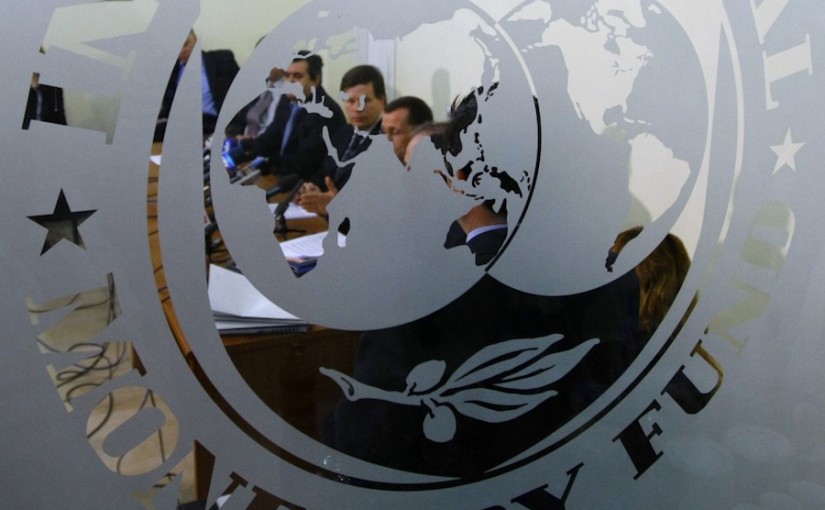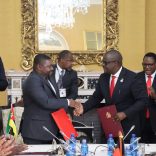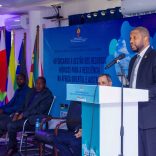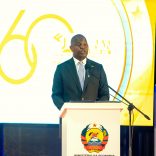Mozambique and Malawi sign three bilateral agreements, Chakwera lauds 50 years relationship
IMF mission makes normal relations dependent on audit – Mozambique

The mission from the International Monetary Fund (IMF), which visited Maputo from 22 to 29 September, while welcoming recent economic measures taken by the government, has not promised any immediate resumption in financial support to Mozambique.
A statement issued on Thursday by the head of the mission, Michel Lazare, dashed any hope the government may have had that normal relations with its international partners could be restored in the near future.
Lazare said “The authorities have requested the Fund to resume discussions on financial support as soon as possible. A solid track record of implementation of sound macroeconomic policies and an effective initiation of the audit process in the near term would help to create the conditions for a possible resumption of program discussions with the IMF”.
The audit in question is of three enormous loans from European banks (mostly from Credit Suisse and the Russian bank VTB) to quasi-public companies that were guaranteed by the previous government under President Armando Guebuza.
The loans were to the Mozambique Tuna Company (EMATUM – 850 million US dollars), and to the security-related companies Proindicus (622 million dollars) and Mozambique Asset Management (MAM – 536 million dollars). The government guarantees for these loans added 20 per cent to the country’s foreign debt.
These loans were granted in 2013-2014, but only the EMATUM loan was public knowledge. The Proindicus and MAM loans were not disclosed, either to the Mozambican public or to the country’s international partners, including the IMF.
When the loans became public knowledge in April, the IMF suspended its programme with Mozambique, including the second instalment of a 283 million dollar loan under the Fund’s Standby Credit Facility (SCF). Other partners followed suit, including the 14 donors and funding agencies that used to provide direct support to the state budget. Further disbursements of budget support were suspended.
The IMF made clear that the basic condition for the resumption of normal relations is an independent, international audit of the three loans, to establish exactly which happened to the money (in excess of two billion dollars).
The government accepted the need for an audit and at the recent meeting in Washington between President Filipe Nyusi and IMF Managing Director, Christine Lagarde, it was agreed that the next IMF mission to Mozambique would discuss the terms of reference for the audit, in which the lead Mozambican agency will be the Attorney-General’s Office (PGR).
The PGR has already begun investigations into the loans and has publicly declared that it has found signs of criminal behaviour. Presumably these refer to violations of the budget law. Every year the budget law sets a limit to the amount of borrowing that the government can guarantee. The limit on guarantees in the 2013 budget law was the equivalent of 6.5 million dollars, and in the 2014 law it was the equivalent of 515 million dollars. Guarantees for loans of more than two billion dollars were in flagrant violation of these laws.
The IMF mission did not result in terms of reference for the audit, but only began discussions on them. Lazare’s statement said the mission “made considerable progress with the Attorney General’s Office on the drafting of detailed terms of reference (TOR) for an international and independent audit of EMATUM, Proindicus and MAM”.
Lazare added “Drafting of the TOR is ongoing, and is expected to be completed soon”, but gave no firm date. The objective of the audit, the IMF release said, is to “strengthen transparency, governance, and accountability to avoid recurrence of past debt problems”.
Lazare said Mozambique “is facing a challenging economic environment”, with economic growth now in decline. The forecast growth for this year is 3.7 per cent in 2016 (down from 6.6 per cent in 2015). This, he said, “is significantly below levels observed in recent years”.
Inflation had risen sharply, with the annual inflation rate reaching 21 per cent in August, while the Mozambican currency, the metical has depreciated by over 40 per cent since the start of 2016.
“At the same time, a significant decline in imports has been more than offset by a weakening of exports, foreign direct investment, and donor financing”, Lazare added. “This has maintained pressure on international reserves, which have continued to decline”.
The mission, he said, welcomed the measures taken recently by the government, including the amended 2016 budget, which includes measures “to contain non-essential spending”. Lazare also expressed approval of the Bank of Mozambique’s monetary measures, including an increase in the benchmark interest rate by 300 base points (so that the rate is now 17.25 per cent). This, Lazare claimed, would “reduce excess liquidity”.
He thought it appropriate that the exchange rate has been allowed to fluctuate “to help restore balance between supply and demand for foreign exchange and support the needed ongoing balance of payments’ adjustment, while limiting the loss of international reserves”.
Lazare added that “further policy tightening is needed to safeguard macroeconomic stability”. He approved of the austerity budget for 2017 which the government will bring before parliament later this year. He believed that budget “is set to further consolidate the state of public finances while preserving critical social programs”
The IMF also “welcomed the central bank’s intent to continue adjusting its monetary stance to help reduce inflationary pressures”.
From Lazare’s words it is very clear that normal relations between Mozambique and the international financial institutions will only resume once the audit of EMATUM, Proindicus and MAM is held.













Leave a Reply
Be the First to Comment!
You must be logged in to post a comment.
You must be logged in to post a comment.